overall vitality
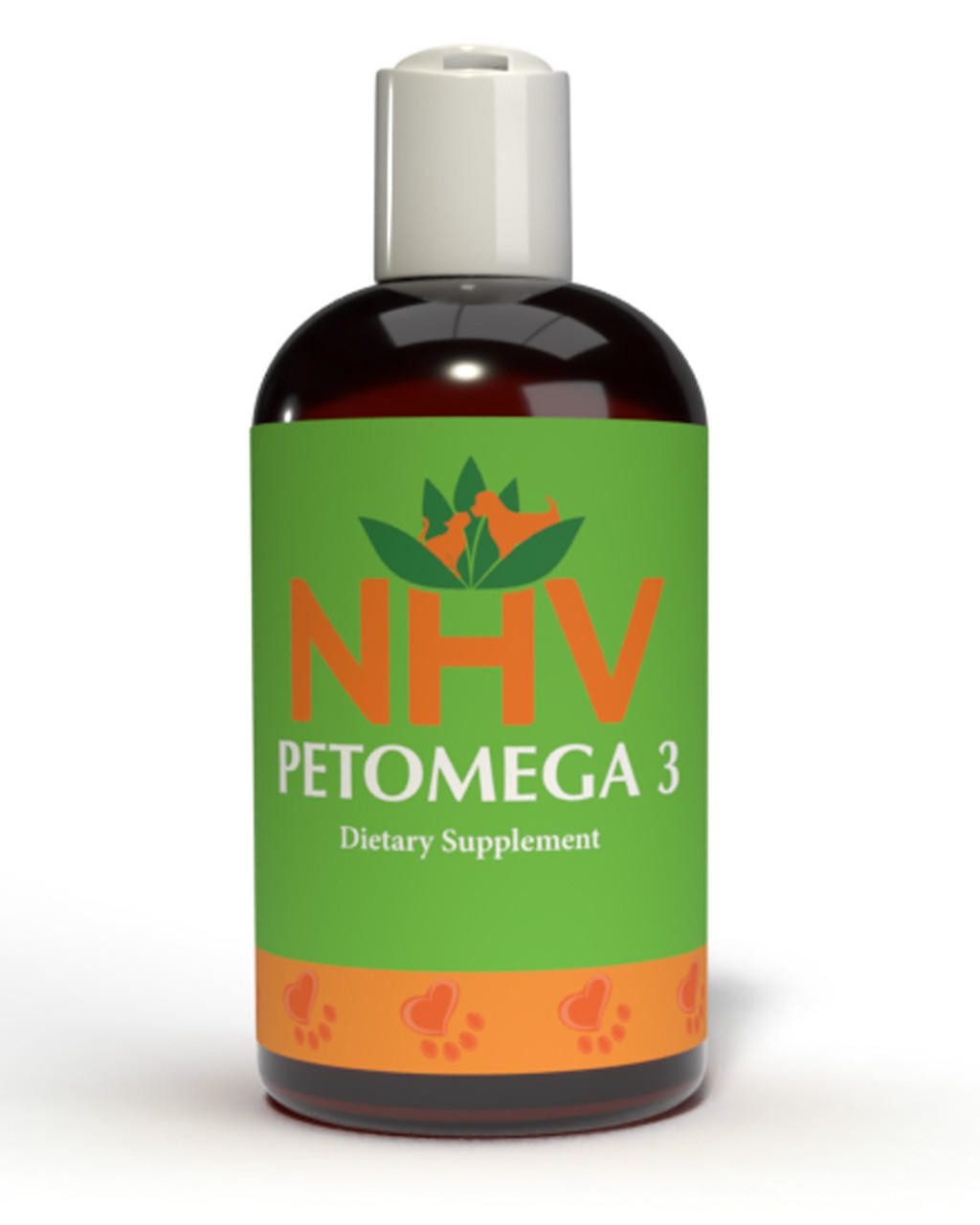
free shipping over $100 (USA & Canada)
1-877-937-4372 the pet expert hotline
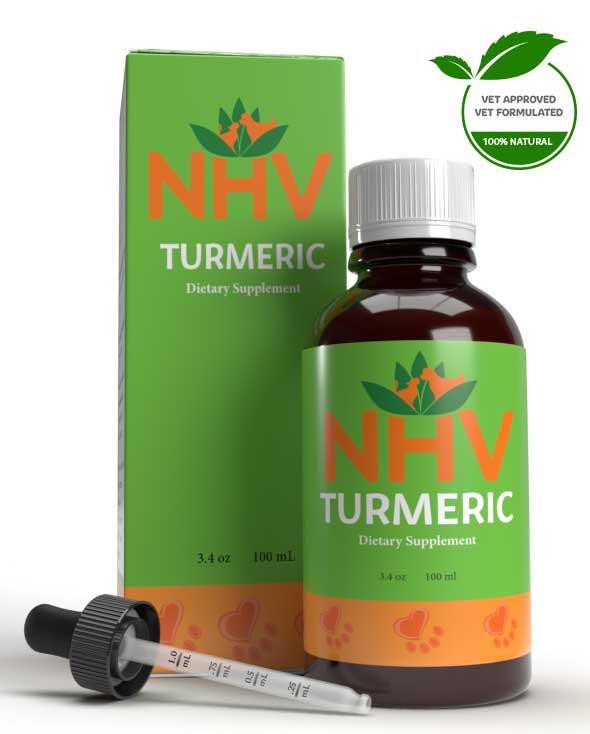
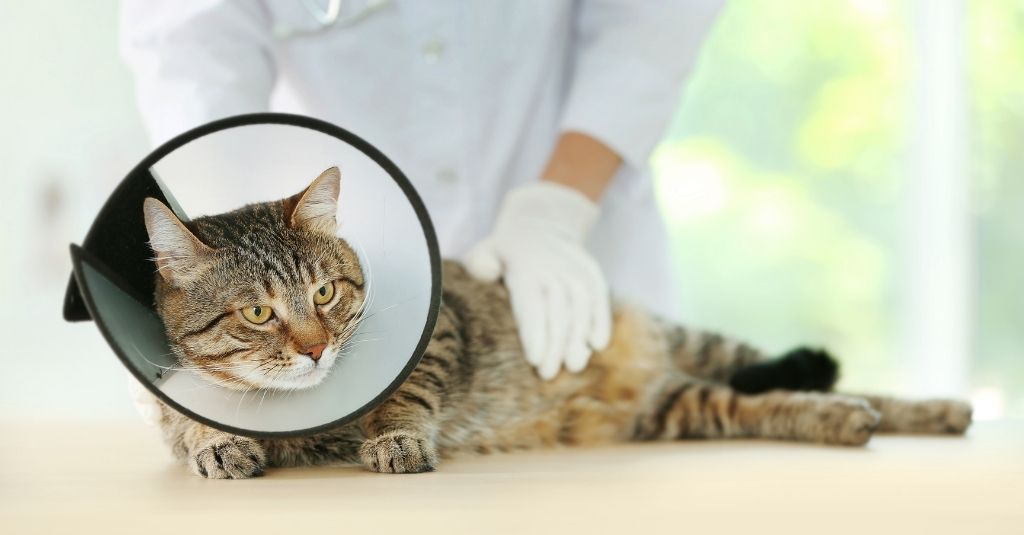
Spaying is a term that refers to the removal of the female reproductive organs, the ovaries and/or the uterus. Some pet owners may have concerns when talking about spaying their pets. You may ask yourself if there are benefits or if you will regret it in the future. So here are some good reasons to spay your dog or cat:
Most vets recommend spaying after the pet has all of their adult teeth and have received all their vaccines.
The right age to spay a female dog or cat can vary. Most veterinarians recommend it between six and eight months of age when the pet already has all of their adult teeth and has received all their vaccines. However, for large females, it is ideal is to wait until they are one year old to perform the spay.
Your veterinarian will give the instruction, but generally, some tests are done to make sure that your little one is healthy. For example, blood work, a CKG, etc. Food and water are often withheld the night before the surgery to prevent vomiting and aspiration.
Even though spaying is a safe procedure, and your fur baby may recover quickly, you will still have to pay attention if everything goes well after the surgery. Ovariohysterectomy (spay for females) is performed under general anesthesia, only a small incision is made in the abdomen of the female.
In general, it is not necessary for your little one to be hospitalized after the effects of anesthesia, she can continue the recovery from home, of course, following the veterinarian’s instructions. For example:
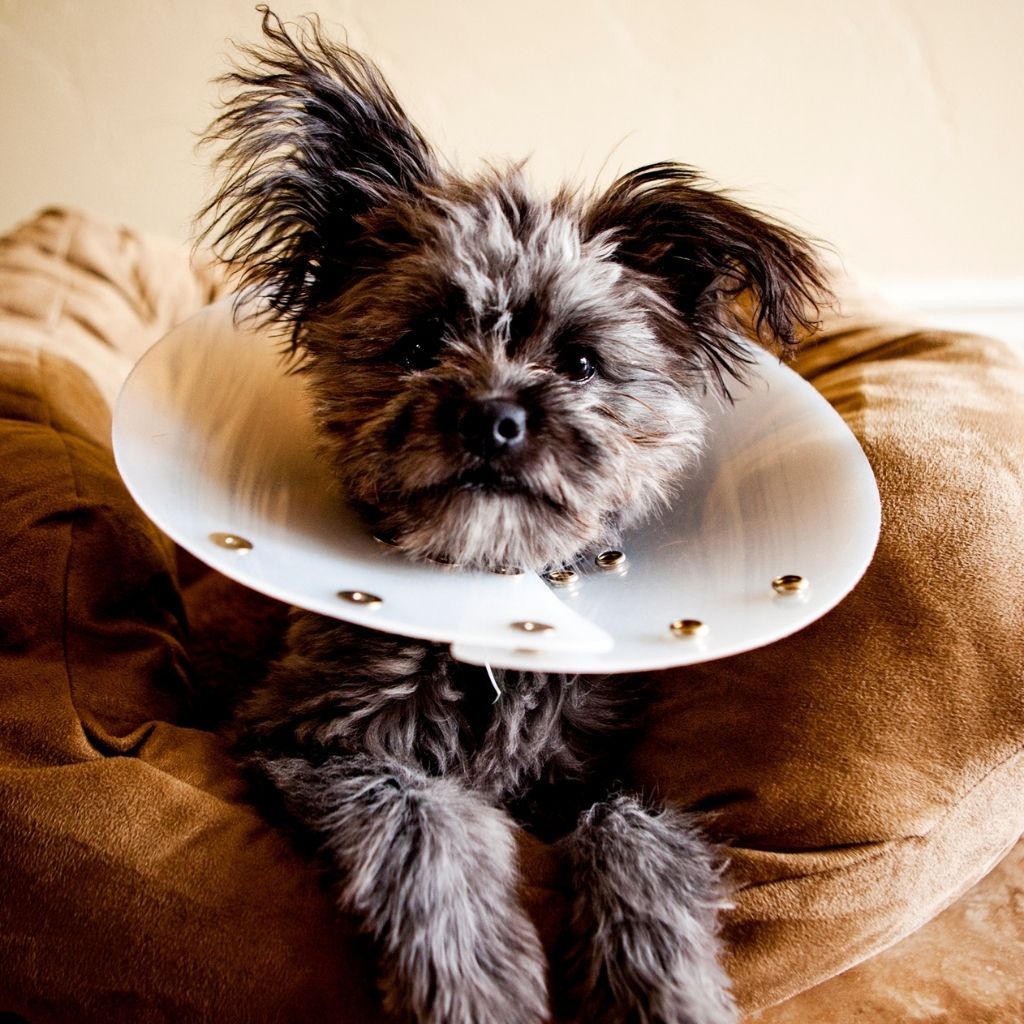
Keep in mind that it can take around 10 days to recover from the surgery to return the normal life. In the meantime, you will have to be patient and pay close attention that nothing gets off track. For instance:
We suggest to stop giving supplements 7 days before and 3 days after the surgery. It is recommended because some of the ingredients present in some herbs may interact with the anesthetic medication. However, after 3 days of the surgery, you can give the supplements again.
The supplements may help decrease discomfort, inflammation, and bacterial infections. I personally like to suggest Turmeric, Petomega 3, Old Timer, Natures Immuno, and Multi Essentials.
Turmeric, Petomega 3, and Old Timer have properties that may be helpful to control discomfort. They also have anti-inflammatory and anti-bacterial properties that are beneficial for your little one after any surgery. These herbal formulations have been shown to have significant wound healing properties. They act on various stages of the natural wound healing process to hasten healing.
Natures Immuno and Multi Essentials will offer some nutrients that your little one will need after surgery, especially because she may lose some blood. The properties present in these formulations can support the immune system to produce more red and white blood cells. For example, the mushrooms and herbs present in Natures Immuno and Multi Essentials provide a significant amount of iron, which promotes the formation of red blood cells (RBCs) in the body.
The most important thing, pets tend to sense their owner’s emotions and if you are nervous it will cause stress to your little one. When you bring your fur baby for surgery do your best to be calm and reassuring.
overall vitality

For Overall Health and Well-Being
buy 2 and save $3
An Omega 3 supplement for cats to support their joints, heart, eyes, immune system, and overall organ function.

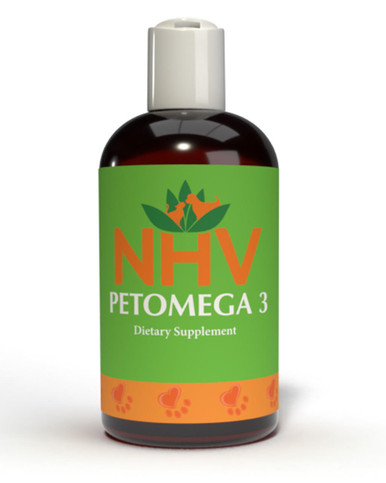
An Omega 3 supplement for cats to support their joints, heart, eyes, immune system, and overall organ function.

Our cat omega 3 supplement is naturally made from the oils of sardines, anchovies, and North Atlantic cod. It’s an excellent source of EPA (Eicosapentaenoic Acid 600mg) and DHA (Docosahexaenoic acid 460mg) essential omega 3 fatty acids. It’s molecularly distilled and cold-pressed to improve the bioavailability
Support your cat with human-grade quality omega 3 fish oil supplements. Many processed pet foods are deficient in this important nutrient. And according to the University of Maryland Medical Center, "It is very important to maintain a balance between omega-3 and omega-6 fatty acids in the diet. A proper balance helps maintain and even improve health."
It’s important for cats to get essential fatty acids through their diet. This omega 3 supplement for cats will help keep them healthy, and even finicky cats actually like to take it.
Benefits of Cat omega 3 supplements:
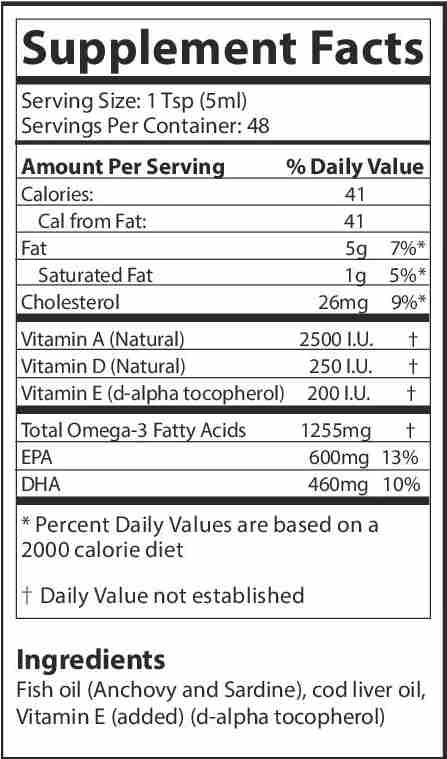
Suggested Dosage: To be taken once per day. Add to food based on weight chart.
Therapeutic Dosage: Double the quantity for maximum period of 4 weeks or follow veterinarian advise.
Pet’s Weight Dosage
0-15 lb = ¼ tsp
15-30 lb = ½ tsp
30-60 lb = 1 tsp
60-90 lb = 1 ½ tsp
How to Administer: Shake well before use. The easiest method is to add the dosage to your pets food. Some pets can be finicky, if this occurs consider hiding the appropriate amount in food most pet’s love such as fish, chicken, yogurt, or a favorite treat. If your pet only eats dry food then soak kibbles at feeding time.
For Best Results
Dietary supplements are beneficial to the health and well-being of your pet and are safe for long-term use. Every pet responds to natural supplements differently, therefore it is important to be consistent and administer the product daily. Supplements generally take two to four weeks to take effect, however this will vary from one animal to the next.
Product Storage
All NHV Natural Pet Products contain no artificial additives, preservatives or coloring. Shelf life after opening is 6 months and must be refrigerated after opening.
Cautions and Contraindications
Avoid During Pregnancy.
Our cat omega 3 supplement is naturally made from the oils of sardines, anchovies, and North Atlantic cod. It’s an excellent source of EPA (Eicosapentaenoic Acid 600mg) and DHA (Docosahexaenoic acid 460mg) essential omega 3 fatty acids. It’s molecularly distilled and cold-pressed to improve the bioavailability
Support your cat with human-grade quality omega 3 fish oil supplements. Many processed pet foods are deficient in this important nutrient. And according to the University of Maryland Medical Center, "It is very important to maintain a balance between omega-3 and omega-6 fatty acids in the diet. A proper balance helps maintain and even improve health."
It’s important for cats to get essential fatty acids through their diet. This omega 3 supplement for cats will help keep them healthy, and even finicky cats actually like to take it.
Benefits of Cat omega 3 supplements:

Suggested Dosage: To be taken once per day. Add to food based on weight chart.
Therapeutic Dosage: Double the quantity for maximum period of 4 weeks or follow veterinarian advise.
Pet’s Weight Dosage
0-15 lb = ¼ tsp
15-30 lb = ½ tsp
30-60 lb = 1 tsp
60-90 lb = 1 ½ tsp
How to Administer: Shake well before use. The easiest method is to add the dosage to your pets food. Some pets can be finicky, if this occurs consider hiding the appropriate amount in food most pet’s love such as fish, chicken, yogurt, or a favorite treat. If your pet only eats dry food then soak kibbles at feeding time.
For Best Results
Dietary supplements are beneficial to the health and well-being of your pet and are safe for long-term use. Every pet responds to natural supplements differently, therefore it is important to be consistent and administer the product daily. Supplements generally take two to four weeks to take effect, however this will vary from one animal to the next.
Product Storage
All NHV Natural Pet Products contain no artificial additives, preservatives or coloring. Shelf life after opening is 6 months and must be refrigerated after opening.
Cautions and Contraindications
Avoid During Pregnancy.
joint support
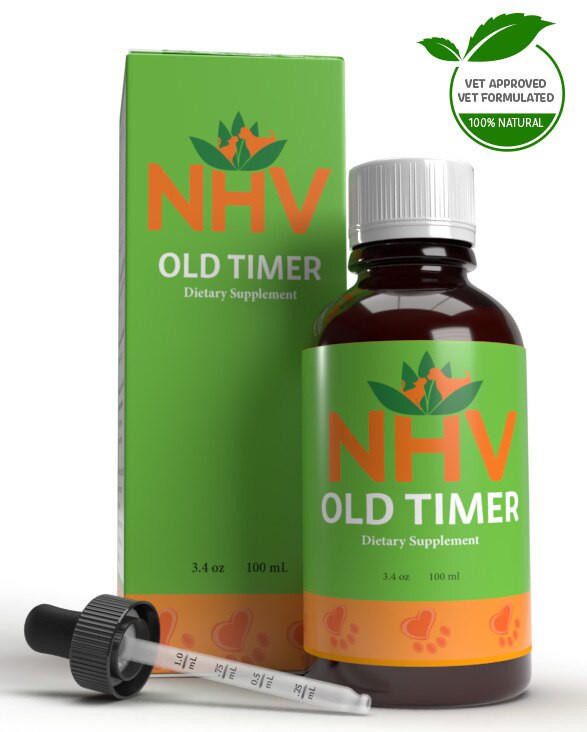
Natural dog joint support to alleviate arthritis, muscle, and joint discomfort
buy 2 and save $3
3 month supply for a small to medium size pet
NHV’s Old Timer joint support for dogs provides your canine companion with natural support to help alleviate arthritis, muscle, and joint discomfort. Just one bottle contains a 100 day supply for a small-medium sized dog.


NHV’s Old Timer joint support for dogs provides your canine companion with natural support to help alleviate arthritis, muscle, and joint discomfort. Just one bottle contains a 100 day supply for a small-medium sized dog.

Getting older is never easy, especially for dogs. Arthritis is a degenerative disease that progresses with age. It is a debilitating condition that can lead to impaired mobility and even hip dysplasia in dogs.
Finding the right supplements for older dogs can be a challenge, but NHV’s supplements are safe to be given along with any vet prescribed medications. NHV Old Timer can be given to dogs of any age. In fact, we would recommend starting the Old Timer at mid-age even before severe arthritis develops, as a natural and effective proactive care regimen.
We also have a complete Rejuvenation Kit for arthritis and joint discomfort.
Just because your dog is getting older doesn’t mean playtime is over. Read how Snuku bounces back from arthritis with Old Timer dog joint support supplements.
If you have questions, you can ask an NHV expert because we are here to help give guidance and support so your precious pooch can jump for joy and raise the ruff!
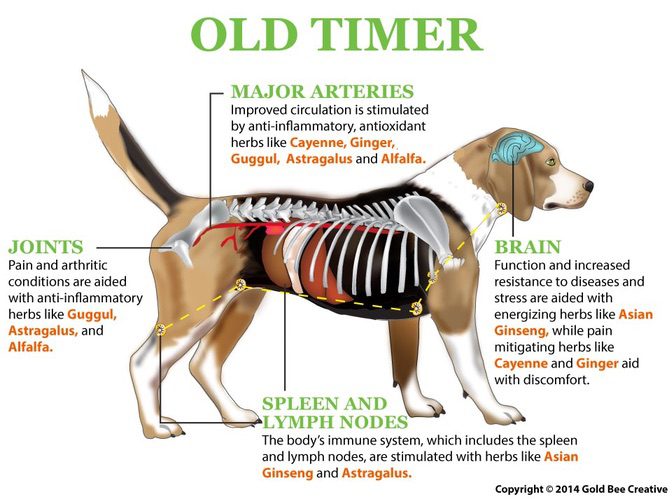
Six potent herbal ingredients will target the entire body to provide dogs support with joints, spleen, lymph nodes, major arteries.
Select your pet's weight to determine the correct dose.
To be taken twice daily. Determine your pet’s weight and then use the easy chart below to determine the correct dose. This is the minimum dosage.
Pet's Weight Dosage
0 - 15 lb = 0.5 ml
16 - 30 lb = 1.0 ml
31 - 45 lb = 1.5 ml
46 - 60 lb = 2.0 ml
61 - 75 lb = 2.5 ml
Over 75 lb = 3.0 ml
How to Administer
Shake well before use. The easiest method is to use the dropper provide and places the drops into your pet’s food or favorite treat. You can also use the dropper and squirt directly into the pet’s mouth.
Some pets can be finicky, if this occurs consider hiding the drops in foods most pet’s love such as fish, chicken or yogurt or a favorite treat. If your pet only eats dry food then soak a few kibbles at feeding time.
For Best Results
Herbal dietary supplements are beneficial to the health and wellbeing of your pet and are safe for long-term use. Every pet responds to natural herbal supplements differently, therefore it is important to be consistent and administer the product daily. Supplements generally take two to four weeks to take effect, however this will vary from one animal to the next.
Product Storage
All NHV Natural Pet Products are pure herbal extracts and contain no artificial additives, preservatives or coloring. Shelf life after opening is 6 months and must be refrigerated after opening.
Cautions and Contraindications
Do not use Old Timer in pregnant or nursing animals. Should be used in moderation in cases of sensitive digestive tract. Speak to your vet before using our products. A second visit is recommended if your pet’s condition does not improve, or deteriorates after continued use of the supplements.
All information provided by NHV Natural Pet Products is for educational purposes only.
Getting older is never easy, especially for dogs. Arthritis is a degenerative disease that progresses with age. It is a debilitating condition that can lead to impaired mobility and even hip dysplasia in dogs.
Finding the right supplements for older dogs can be a challenge, but NHV’s supplements are safe to be given along with any vet prescribed medications. NHV Old Timer can be given to dogs of any age. In fact, we would recommend starting the Old Timer at mid-age even before severe arthritis develops, as a natural and effective proactive care regimen.
We also have a complete Rejuvenation Kit for arthritis and joint discomfort.
Just because your dog is getting older doesn’t mean playtime is over. Read how Snuku bounces back from arthritis with Old Timer dog joint support supplements.
If you have questions, you can ask an NHV expert because we are here to help give guidance and support so your precious pooch can jump for joy and raise the ruff!

Six potent herbal ingredients will target the entire body to provide dogs support with joints, spleen, lymph nodes, major arteries.
Select your pet's weight to determine the correct dose.
To be taken twice daily. Determine your pet’s weight and then use the easy chart below to determine the correct dose. This is the minimum dosage.
Pet's Weight Dosage
0 - 15 lb = 0.5 ml
16 - 30 lb = 1.0 ml
31 - 45 lb = 1.5 ml
46 - 60 lb = 2.0 ml
61 - 75 lb = 2.5 ml
Over 75 lb = 3.0 ml
How to Administer
Shake well before use. The easiest method is to use the dropper provide and places the drops into your pet’s food or favorite treat. You can also use the dropper and squirt directly into the pet’s mouth.
Some pets can be finicky, if this occurs consider hiding the drops in foods most pet’s love such as fish, chicken or yogurt or a favorite treat. If your pet only eats dry food then soak a few kibbles at feeding time.
For Best Results
Herbal dietary supplements are beneficial to the health and wellbeing of your pet and are safe for long-term use. Every pet responds to natural herbal supplements differently, therefore it is important to be consistent and administer the product daily. Supplements generally take two to four weeks to take effect, however this will vary from one animal to the next.
Product Storage
All NHV Natural Pet Products are pure herbal extracts and contain no artificial additives, preservatives or coloring. Shelf life after opening is 6 months and must be refrigerated after opening.
Cautions and Contraindications
Do not use Old Timer in pregnant or nursing animals. Should be used in moderation in cases of sensitive digestive tract. Speak to your vet before using our products. A second visit is recommended if your pet’s condition does not improve, or deteriorates after continued use of the supplements.
All information provided by NHV Natural Pet Products is for educational purposes only.
medicinal mushroom blend
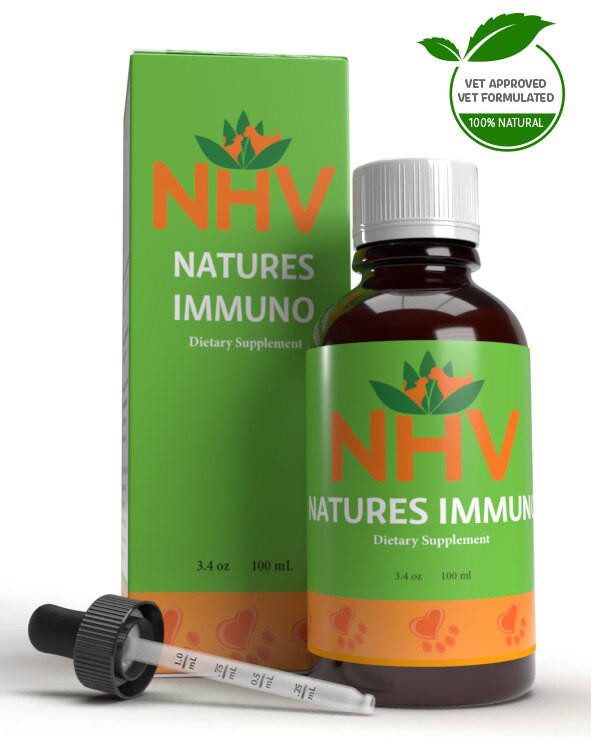
Vet-Formulated Supplement of Medicinal Mushrooms for Dogs
buy 2 and save $3
3 month supply for a small to medium size pet
Natures Immuno is formulated for dogs from Turkey Tail, Cordyceps, Reishi, Shiitake, and Agaricus mushrooms by a holistic veterinarian and master herbalist. Medicinal mushrooms like these have been used for thousands of years in Chinese medicine as well as traditional herbalism. Researchers around the globe are now studying their potential in helping with cancer, balancing the immune system, and helping with digestive problems and more.

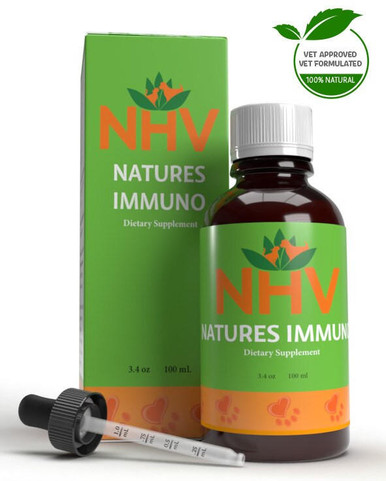
Natures Immuno is formulated for dogs from Turkey Tail, Cordyceps, Reishi, Shiitake, and Agaricus mushrooms by a holistic veterinarian and master herbalist. Medicinal mushrooms like these have been used for thousands of years in Chinese medicine as well as traditional herbalism. Researchers around the globe are now studying their potential in helping with cancer, balancing the immune system, and helping with digestive problems and more.

Natures Immuno Medicinal Mushroom blend for dogs also helps:
Medicinal mushrooms and mushroom extracts are used worldwide to help fight cancer and to help enhance and modulate the immune response of both people and animals. NHV’s mushroom blend contains 5 species of medicinal mushrooms for dogs, which have a long history of use, are well studied, and have been credited with having success against cancer as well as having antioxidant, hypocholesterolemia, anti-tumor, immunomodulatory, anti-allergic, nephroprotective, prebiotic, immunostimulant, anti-inflammatory, cardiovascular, and anti-diabetic properties
Properties of these Medicinal Mushrooms
Benefits of Natures Immuno Medicinal Mushrooms Blend for Dogs
You can read more about medicinal mushrooms for dogs and how they help give added support to pets for cancer and immunity.
NHV carries a wide range of holistic, natural vet-approved remedies that provide support along with a vet-recommended treatment plan. If you have questions about any of our plant-based supplements, ask an NHV expert, because, at NHV, we want your pet to live healthier and longer naturally.
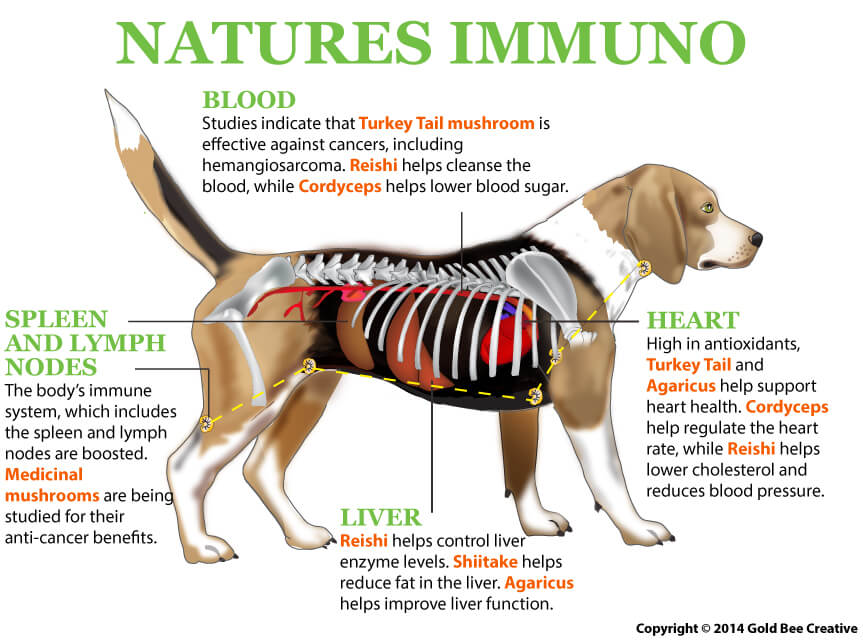
Turkey Tail mushroom is native to Asia, North America, and Europe. It has a long history of use in traditional herbalism and is currently being studied for its health benefits, including its value in fighting cancer. Research has shown that Turkey Tail is beneficial for many types of cancer as it contains properties that help fight cancer cells while helping to strengthen the immune system. Turkey tail mushroom for dogs has shown to be beneficial in spleen and liver hemangiosarcoma in dogs. It is also useful for heart health, lowering cholesterol, digestive issues, and skin problems.
Cordyceps mushroom is very rich in phytonutrients. Research has indicated that these mushrooms demonstrate anti-tumor, immune enhancing and hypoglycemic activity. It has anti-inflammatory, antioxidant, anti-tumor, anti-cancer, antimetastatic, and antiviral properties. It is very useful for diabetes as it helps lower blood sugar. Cordyceps also help enhance lymphocyte activity, which balance the immune system.
Reishi mushroom has been used for thousands of years in traditional Chinese medicine. It helps detoxify the blood, helps lower cholesterol and reduces blood pressure. It is also beneficial for the lymphatic system, which helps with a dog’s immunity.
Shiitake mushroom is a popular ingredient in cooking and is highly valued in traditional herbalism for its immune stimulating properties. It helps reduce fat in the liver, helps lower cholesterol, and is beneficial for heart health as it aids in reducing plaque in the arteries. Shiitake may help inhibit the growth of leukemia cells. Shiitake is also a good source of protein, vitamins, and minerals.
Agaricus mushroom is cultivated widely for dietary supplements and culinary purposes. Agaricus is useful for bone health, and helps with insulin production and helps with liver function. Agaricus is considered an adaptogen, which helps combat stress and supports the endocrine functions. This mushroom is currently used in Japan as an adjunctive with chemotherapy treatments.
Select your pet's weight to determine the correct dose.
To be taken twice daily.
Determine your pet’s weight and then use the easy chart below to determine the correct dose. You can safely double the recommended dosage.
Pet's Weight Dosage
0 - 15 lb 0.5 mL
16 - 30 lb 1.0 mL
31 - 45 lb 1.5 mL
46 - 60 lb 2.0 mL
61 - 75 lb 2.5 mL
Over 75 lb 3.0 mL
For small animals (rabbits, ferrets), avians and reptiles use 1 drop for every 2 lb of body weight.
How to Administer
Shake well before use. The easiest method is to use the dropper provided and place the drops into your pet’s food or favorite treat. You can also use the dropper and squirt directly into the pet’s mouth. Some pets can be finicky, if this occurs consider hiding the drops in foods most pet’s love such as fish, chicken, yogurt, or a favorite treat. If your pet only eats dry food then soak a few kibbles at feeding time.
For Best Results
Herbal dietary supplements are beneficial to the health and well-being of your pet and are safe for long-term use. Every pet responds to natural herbal supplements differently, therefore it is important to be consistent and administer the product daily. Supplements generally take two to four weeks to take effect, however this will vary from one animal to the next.
Product Storage
All NHV Natural Pet Products are pure herbal extracts and contain no artificial additives, preservatives or coloring. Shelf life after opening is 6 months and must be refrigerated after opening.
Natures Immuno Medicinal Mushroom blend for dogs also helps:
Medicinal mushrooms and mushroom extracts are used worldwide to help fight cancer and to help enhance and modulate the immune response of both people and animals. NHV’s mushroom blend contains 5 species of medicinal mushrooms for dogs, which have a long history of use, are well studied, and have been credited with having success against cancer as well as having antioxidant, hypocholesterolemia, anti-tumor, immunomodulatory, anti-allergic, nephroprotective, prebiotic, immunostimulant, anti-inflammatory, cardiovascular, and anti-diabetic properties
Properties of these Medicinal Mushrooms
Benefits of Natures Immuno Medicinal Mushrooms Blend for Dogs
You can read more about medicinal mushrooms for dogs and how they help give added support to pets for cancer and immunity.
NHV carries a wide range of holistic, natural vet-approved remedies that provide support along with a vet-recommended treatment plan. If you have questions about any of our plant-based supplements, ask an NHV expert, because, at NHV, we want your pet to live healthier and longer naturally.

Turkey Tail mushroom is native to Asia, North America, and Europe. It has a long history of use in traditional herbalism and is currently being studied for its health benefits, including its value in fighting cancer. Research has shown that Turkey Tail is beneficial for many types of cancer as it contains properties that help fight cancer cells while helping to strengthen the immune system. Turkey tail mushroom for dogs has shown to be beneficial in spleen and liver hemangiosarcoma in dogs. It is also useful for heart health, lowering cholesterol, digestive issues, and skin problems.
Cordyceps mushroom is very rich in phytonutrients. Research has indicated that these mushrooms demonstrate anti-tumor, immune enhancing and hypoglycemic activity. It has anti-inflammatory, antioxidant, anti-tumor, anti-cancer, antimetastatic, and antiviral properties. It is very useful for diabetes as it helps lower blood sugar. Cordyceps also help enhance lymphocyte activity, which balance the immune system.
Reishi mushroom has been used for thousands of years in traditional Chinese medicine. It helps detoxify the blood, helps lower cholesterol and reduces blood pressure. It is also beneficial for the lymphatic system, which helps with a dog’s immunity.
Shiitake mushroom is a popular ingredient in cooking and is highly valued in traditional herbalism for its immune stimulating properties. It helps reduce fat in the liver, helps lower cholesterol, and is beneficial for heart health as it aids in reducing plaque in the arteries. Shiitake may help inhibit the growth of leukemia cells. Shiitake is also a good source of protein, vitamins, and minerals.
Agaricus mushroom is cultivated widely for dietary supplements and culinary purposes. Agaricus is useful for bone health, and helps with insulin production and helps with liver function. Agaricus is considered an adaptogen, which helps combat stress and supports the endocrine functions. This mushroom is currently used in Japan as an adjunctive with chemotherapy treatments.
Select your pet's weight to determine the correct dose.
To be taken twice daily.
Determine your pet’s weight and then use the easy chart below to determine the correct dose. You can safely double the recommended dosage.
Pet's Weight Dosage
0 - 15 lb 0.5 mL
16 - 30 lb 1.0 mL
31 - 45 lb 1.5 mL
46 - 60 lb 2.0 mL
61 - 75 lb 2.5 mL
Over 75 lb 3.0 mL
For small animals (rabbits, ferrets), avians and reptiles use 1 drop for every 2 lb of body weight.
How to Administer
Shake well before use. The easiest method is to use the dropper provided and place the drops into your pet’s food or favorite treat. You can also use the dropper and squirt directly into the pet’s mouth. Some pets can be finicky, if this occurs consider hiding the drops in foods most pet’s love such as fish, chicken, yogurt, or a favorite treat. If your pet only eats dry food then soak a few kibbles at feeding time.
For Best Results
Herbal dietary supplements are beneficial to the health and well-being of your pet and are safe for long-term use. Every pet responds to natural herbal supplements differently, therefore it is important to be consistent and administer the product daily. Supplements generally take two to four weeks to take effect, however this will vary from one animal to the next.
Product Storage
All NHV Natural Pet Products are pure herbal extracts and contain no artificial additives, preservatives or coloring. Shelf life after opening is 6 months and must be refrigerated after opening.
Published: April 15, 2021